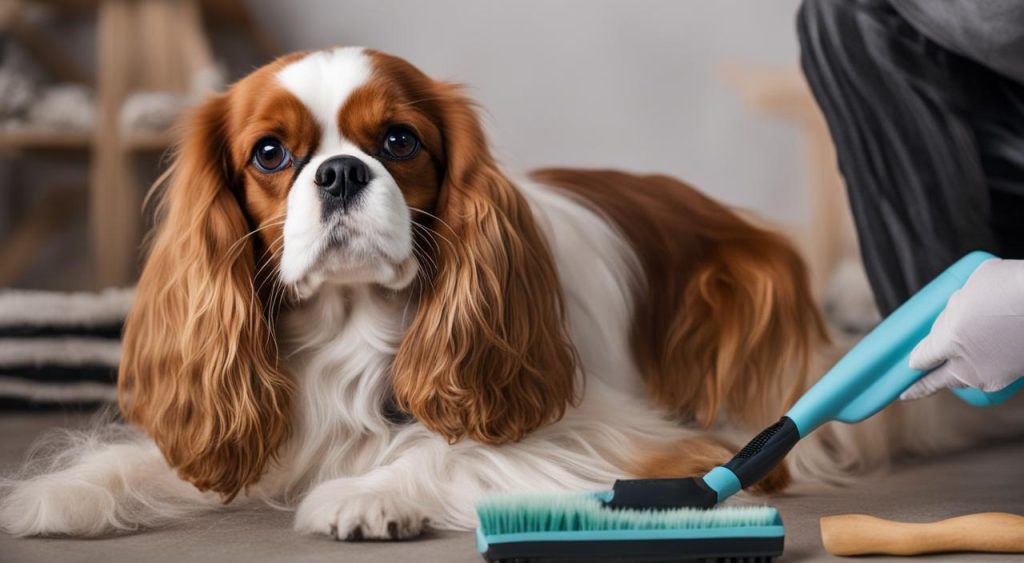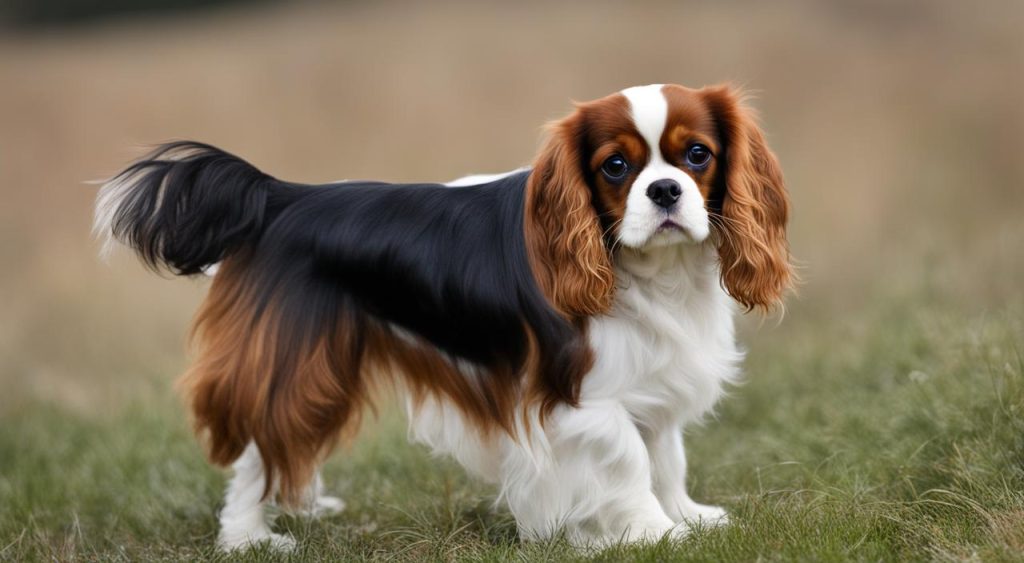The Cavalier King Charles Spaniel is a sweet-tempered, playful, and gentle breed known for its affectionate nature. They are great lap dogs, enjoy cuddling and snuggling, and are willing to please their owners. Cavaliers are polite and peaceful with everyone, including other animals, making them a good fit for families with children. However, they are highly dependent on human companionship and can develop separation anxiety if left alone for long periods of time. They require daily exercise and regular grooming to maintain their beautiful coat. While Cavaliers are generally well-behaved, they may have some timidity or independent streaks that require early socialization and consistent training. The breed is prone to several health issues, including heart disease, syringomyelia, epilepsy, hip dysplasia, and eye diseases, which can be costly to manage. Cavaliers also shed a lot and may not be suitable for people with allergies. Overall, owning a Cavalier King Charles Spaniel requires careful consideration of the breed’s needs and potential health concerns.
Key Takeaways:
- Cavalier King Charles Spaniels are highly affectionate, playful, and eager to please their owners.
- They are great with children and get along well with other dogs, despite their small size.
- This breed is known for being relatively quiet and doesn’t bark excessively.
- The Cavalier King Charles Spaniel is prone to several hereditary health conditions, including heart disease, syringomyelia, eye problems, hip dysplasia, and more.
- Regular grooming is required to maintain their beautiful coat and prevent matting.
Pros of Owning a Cavalier King Charles Spaniel
The Cavalier King Charles Spaniel offers numerous benefits to its owners. Here are some of the positive aspects that make this breed a popular choice:
Affectionate and Playful: Cavalier King Charles Spaniels are known for their loving and affectionate nature. They form strong bonds with their owners and enjoy spending time together. These dogs are also playful and will enthusiastically engage in games and activities.
Great with Children: Cavaliers have a gentle and kind temperament, making them excellent companions for children. They are patient, tolerant, and enjoy playing with kids. Their small size also eliminates any concerns about accidentally knocking over young children.
Well-suited for Small Homes: If you live in an apartment or have limited space, a Cavalier King Charles Spaniel is an ideal choice. They don’t require a large yard or excessive exercise. Their low exercise needs make them suitable for individuals or families with busy schedules.
Relatively Quiet: Unlike some other breeds, Cavaliers are generally quiet and don’t bark excessively. This makes them suitable for living in close proximity to neighbors or in shared living spaces.
Intelligent and Easy to Train: Cavalier King Charles Spaniels are intelligent dogs and quick learners. They respond well to positive reinforcement training methods and can easily pick up new commands and tricks. This makes them a joy to train and ensures a well-behaved pet.
Good Companions for Limited Mobility: If you have limited mobility or can’t walk long distances, a Cavalier King Charles Spaniel can be a perfect companion. They don’t require vigorous exercise and are content with shorter walks or indoor playtime.
Affectionate Temperament: Cavaliers are known for their sweet and affectionate nature. They love to cuddle, snuggle, and shower their owners with love and attention. Their gentle disposition makes them excellent therapy dogs as well.
In conclusion, owning a Cavalier King Charles Spaniel brings a multitude of advantages, including their affectionate nature, compatibility with children, suitability for small homes, quiet demeanor, intelligence, adaptability to limited mobility, and their overall affectionate temperament.
Cons of a Cavalier King Charles Spaniel
The Cavalier King Charles Spaniel has several potential drawbacks to consider before bringing one into your home:
- Hereditary health conditions: This breed is prone to various health issues such as heart disease, syringomyelia, eye problems, hip dysplasia, and more. These conditions can lead to high veterinary costs and ongoing medical care.
- Regular grooming: Cavaliers have beautiful, flowing coats that require regular grooming to prevent matting. This can be time-consuming and may require professional assistance.
- Separation anxiety: Cavaliers are dependent on human companionship and do not tolerate being left alone for long periods of time. They can develop separation anxiety, which may result in destructive behavior or excessive barking.
- Not suitable as guard dogs: Due to their friendly nature and tendency to socialize with strangers, Cavaliers are not appropriate as guard dogs. They are more likely to seek attention and affection from everyone they encounter.
- Expensive to purchase and care for: Buying a Cavalier from a reputable breeder can be costly, and ongoing veterinary expenses can add up. Additionally, their potential health issues may require specialized care and treatment throughout their lives.
- Not hypoallergenic: Despite their beautiful coat, Cavaliers are not hypoallergenic and shed a lot. This can be problematic for individuals with allergies.
- Prey drive and chasing instincts: Cavaliers should not be let off the leash in open areas as they have a prey drive and may chase small animals. It’s important to keep them in a secure and controlled environment.
- Time and commitment: Cavaliers require attention, exercise, and socialization. If you have limited time to spend with your pet or travel frequently, this breed may not be the best fit for your lifestyle.
While a Cavalier King Charles Spaniel can be a wonderful companion, it’s essential to weigh the potential drawbacks before making a decision.
Conclusion
Owning a Cavalier King Charles Spaniel comes with both advantages and disadvantages. These beloved dogs are known for their affectionate nature, playful personalities, and suitability for small homes. They are excellent companions for children and get along well with other animals. However, it’s important to consider their grooming needs and potential health issues.
Cavaliers require regular grooming to keep their beautiful coats in top condition, which may involve regular brushing and occasional professional grooming. Additionally, they can be prone to various health problems, including heart disease, syringomyelia, hip dysplasia, and eye diseases. Prospective owners should be prepared for potential health challenges and ensure they have the resources to provide proper healthcare.
While Cavaliers thrive on human companionship and make wonderful family pets, their dependency on their owners can lead to separation anxiety if left alone for extended periods. It’s essential to provide them with sufficient social interaction and mental stimulation to prevent anxiety-related behaviors.
Before making the decision to bring a Cavalier King Charles Spaniel into your life, carefully assess their needs, potential health concerns, and the commitment required to meet those needs. While they can bring immense joy and love into a home, being aware of the breed’s characteristics and challenges will help you provide the best possible care and create a happy and healthy life together.





